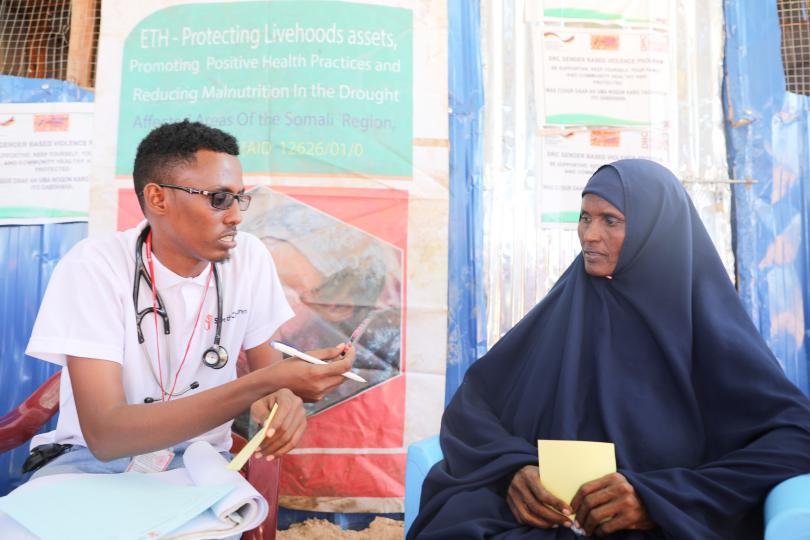How Mobile Health Clinics Support Displaced Communities

Story summary:
Hasba, 42, resides in a camp for internally displaced persons (IDPs) in the Liban Zone of Somali region, along with her husband and nine children. They fled their hometown in Oromia region due to ethnic conflict. It has been two years since they relocated to Somali region.
Hasba and her family regularly receives support from the mobile health clinic established by Save the Children through funding support from the Italian Agency for Development Cooperation (AICS).
The IDP community has been receiving essential healthcare services from the mobile health clinic including vaccination, basic medical examinations, medications, and follow-up care. Additionally, pregnant mothers receive nutrition support, while children who are at risk of being underweight are provided with specialized care and attention.
Hasba’s story in her own words (Quotes)
“My name is Habsa. I am 42 years old and a mother of nine.
“We used to live in Negele, but due to conflict, my family and I had to relocate to this camp. We have been living here for two years. Life as an internally displaced person is very difficult for us.”
“We sustain our lives with support from organizations like Save the Children. Before becoming internally displaced, we used to have animals and farming. However, we left everything behind and came here for our safety as the conflict continued to erupt periodically. Although we had many possessions there, peace was constantly disturbed. Here, life is challenging, but at least there is peace.”
“I am one of the community members who come to get assistance from the clinic. I am not feeling well this time, so I came here to follow up on my health. My family also relies on the services provided here. The health team assesses our situation and provides medicines. We are grateful for their support.”
We aspire to transition from being IDPs to settlers. If given the opportunity, we would like to move out of the camp and start businesses, engage in farming, rearing animals, and establish a stable life. However, we lack the capital to initiate any of these. We need the government and other organizations’ support."

Background / Project information
The project, funded by the AICS - Italian Agency for Development Cooperation, focuses on protecting livelihood assets, promoting positive health practices, and reducing malnutrition in drought-affected areas of the Somali region in Ethiopia. It aims to save lives and support the most vulnerable host and internally displaced person (IDP) households impacted by prolonged droughts.It targets the most vulnerable host and IDP households affected by prolonged droughts in the region. Integrated FSL, health and nutrition programming linked to relevant services maximizes impact on vulnerable people in need. The project’s targeted areas are overlapped purposely to ensure access to multi-sectoral services and to multiply the impact of the project. Nutrition is the entry point for Food Security and Livelihoods (FSL)interventions, targeting pregnant and lactating women (PLW) and children under five as well as women affected by acute malnutrition. The multi-purpose cash transfers cover vulnerable household’s basic needs and prevent them from resorting to negative coping strategies, notably affecting the nutritional status of children and PLW. In addition to the monthly transfer of multi-purpose cash and income generating activity (IGA) assistance, Save the Children provides its project participants with nutrition support, consisting of case management, referral system, infant and young children feeding (IYCF), social behavioral change communication (SBCC) on issues such as IYCF practices, health seeking, and nutrition and hygiene and sanitation promotion sessions for PLW, mothers and caretakers. The health response at community and facility level compliments FSL and nutrition response by availing referral systems. Caretakers with identified malnutrition cases but unable to cover transportation service costs to service points use service vouchers for their work. The community and facility level health services helps prevent communicable diseases that deteriorate nutritional statuses of PLW and children, in addition to protecting families from additional health service costs.





